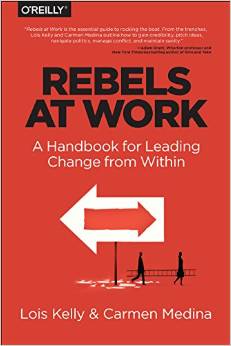Have you heard that Lois and I have a book coming out this fall, published by O'Reilly Media, called Rebels at Work: A Handbook for Leading Change from Within? Needless to say, we're trying to act really cool about it. I, for one, only bring it up three or four times a day in the course of ordinary conversation.

When I mention it, I get some interesting reactions. Just this weekend a friend of a friend and I were chatting about it; he's a successful businessman and lawyer. When I told him the title and described the content he looked confused and said:
"And so you think corporations would actually pay you to come in and teach their employees to be rebels?"
After thinking about it for a bit he offered me a new title: "Provocateurs at Work."
I'm not sure that's any less scary to large organizations than Rebels at Work. But what interested me most about the conversation is the fact that my interlocutor, who would probably describe himself as a libertarian, would get so queasy about the idea of helping rebels inside large organizations. There it is again--that, to my knowledge unproven, assertion that corporations operate best when employees conform.
There's clearly a lot of work to be done.
Another conversation was with a friend whom I mention in the book, Clark, who has always been much more comfortable with conflict than I have ever been. Learning to deal with conflict in the workplace is such an important developmental for rebels that Lois and I devote an entire chapter to it. Although Clark never really thought of himself as a Rebel at Work, he does acknowledge that his honesty in the workplace probably cost him some plum jobs in his career, assignments he wanted and deserved. Honesty at work is not career-enhancing, he said. But a need to be honest and say what needs to be said is a key driver for rebels in the workplace. As Lois and I write in our introduction:
Every day people in all kinds of jobs at all kinds of workplaces reach the point where they say, “Enough.” While every rebel’s reason for stepping up differs, almost all start with the same uncomfortable realization: “I have to do something about this.”
